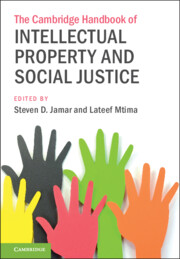Book contents
- The Cambridge Handbook of Intellectual Property and Social Justice
- The Cambridge Handbook of Intellectual Property and Social Justice
- Copyright page
- Dedication
- Contents
- About the Contributors
- Foreword
- Prolusion: What Is Intellectual Property (And Why Should You Care About It Anyway?) – A Layperson’s Guide to Intellectual Property Law
- Introduction: Intellectual Property Social Justice Theory: History, Development, and Description
- Part I IP Social Justice Foundations
- Part II IP Social Justice in Major Intellectual Property Domains
- Part III IP Social Justice: Historical Perspectives
- Part IV IP Social Justice in the Political Economy: Engaging Activism; Achieving Change
- Part V IP Social Justice in the Information Age
- 16 User-Generated Transformation: Intellectual Property, Social Justice, and Fanworks
- 17 Libraries, Copyright Exceptions, and Social Justice
- 18 An Intellectual Property Social Justice Perspective on Intellectual Property Protection for Artificial Intelligence Programs
- Part VI Intellectual Property Social Justice in Global Perspective: Issues in Gender and Development Disparity
- Part VII IP Social Justice: The Future of the Global IP Ecosystem
16 - User-Generated Transformation: Intellectual Property, Social Justice, and Fanworks
from Part V - IP Social Justice in the Information Age
Published online by Cambridge University Press: 04 January 2024
- The Cambridge Handbook of Intellectual Property and Social Justice
- The Cambridge Handbook of Intellectual Property and Social Justice
- Copyright page
- Dedication
- Contents
- About the Contributors
- Foreword
- Prolusion: What Is Intellectual Property (And Why Should You Care About It Anyway?) – A Layperson’s Guide to Intellectual Property Law
- Introduction: Intellectual Property Social Justice Theory: History, Development, and Description
- Part I IP Social Justice Foundations
- Part II IP Social Justice in Major Intellectual Property Domains
- Part III IP Social Justice: Historical Perspectives
- Part IV IP Social Justice in the Political Economy: Engaging Activism; Achieving Change
- Part V IP Social Justice in the Information Age
- 16 User-Generated Transformation: Intellectual Property, Social Justice, and Fanworks
- 17 Libraries, Copyright Exceptions, and Social Justice
- 18 An Intellectual Property Social Justice Perspective on Intellectual Property Protection for Artificial Intelligence Programs
- Part VI Intellectual Property Social Justice in Global Perspective: Issues in Gender and Development Disparity
- Part VII IP Social Justice: The Future of the Global IP Ecosystem
Summary
For as long as there have been works, there have been fanworks – works made by people who feel so passionately about something that they want to discuss it, make new things about it, and join with others who feel similarly about it. Fanworks are often described in the Internet age as kinds of “user-generated content.” Because anyone can make them, share them, and experience them, fanworks provide uncommonly powerful opportunities for expressive empowerment, access, and inclusion. In addition, fanworks are uniquely well suited to advancing social justice by using well-known sources to highlight injustices; and the affinity groups that surround fanworks carry special potential to empower creators and act as sites of progress. At the same time, fanworks have a tense relationship with intellectual property (IP) doctrine and enforcement: fanwork creators are authors in their own rights, but because fanworks build upon pre-existing material, they can also run afoul of actual, perceived, or threatened copyright and trademark risks. This chapter addresses those potentials and precarities. It explores the relationship between fanworks, social justice, and law to highlight how, by providing avenues for access, inclusion, and empowerment, IP doctrines that encourage fan endeavors also advance the goals of IP social justice (IP-SJ).
- Type
- Chapter
- Information
- Publisher: Cambridge University PressPrint publication year: 2024

